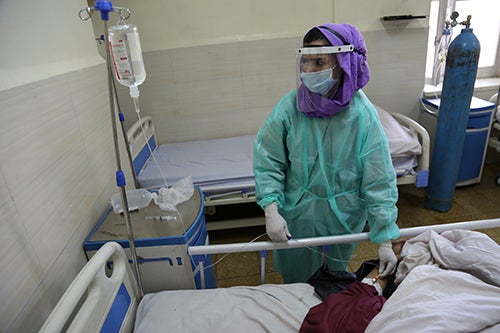News
Demand for Afghanistan’s midwives unflagging during COVID-19 pandemic
- 14 September 2020
News
KABUL, Afghanistan – “When I returned home from work, I had to isolate myself,” described Suhaila Sadat, a midwife at the Malalai Maternity Hospital in Afghanistan. “My parents were worried about me because I interact with patients all day at the hospital. The risk of COVID-19 infection exists here.”
The pandemic has taken a serious toll in Afghanistan. So far, more than 38,000 people have tested positive for the virus, out of 100,000 tested samples. Nearly 10 per cent of confirmed cases are among health professionals.
And Kabul – where Ms. Sadat works – is the most affected part of the country.
The onset of the outbreak in Afghanistan was a particularly difficult time. Ms. Sadat came to the hospital early mornings and left late evenings, but in late March the hospital adopted a flexible work policy. Since then, front-line health workers have reported to work every other day to reduce infection risks.
Despite the stresses, Ms. Sadat remains committed to her work. “I’m scared of the coronavirus, but still I have to serve the women who need my support.”
Even amid the pandemic, Ms. Sadat’s services are as in-demand as ever.

To enable midwives to continue providing antenatal care, safe delivery services and post-natal care, UNFPA is providing infection prevention and control supplies and personal protective equipment (PPE) to the Malalai National Maternity Hospital in Kabul.
Supplies include hand sanitizers, face masks, sodium hypochlorite solution for surface disinfection, foot coverings, hand-washing liquid and rubber gloves, as well as other items.
“We are feeling more secure and safe by wearing masks and gloves, and complying with medical and sanitary advice,” Ms. Sadat told UNFPA.
But she knows the risk of infection cannot be fully eliminated. Her parents, she says, are still anxious about her safety.
“I explained to my parents that I’m complying with all the possible precautionary measures in my workplace every day. But they're still concerned because they know the challenges of the health system of the country.”
Sajia Mansoory is another midwife at the Malalai Maternity Hospital. Like Ms. Sadat, she says these last months have been difficult, but she has accepted the risks.
“I have been trained as a midwife, and it’s my commitment to not leave those who need my support,” she said. “My family encourages and supports me to do my job. But in the meantime, they emphasize on complying with the prevention measures.”
The work of midwives in Afghanistan has always been challenging – they have long faced insecurity, poverty and a poorly resourced health system. Now, with the pandemic, they are undeterred.
“The COVID-19 pandemic is the biggest challenge in our history,” Ms. Mansoory said. “Today pregnant women need our support more than ever. Let’s pledge to do our best to beat the pandemic and gain the biggest victory.”